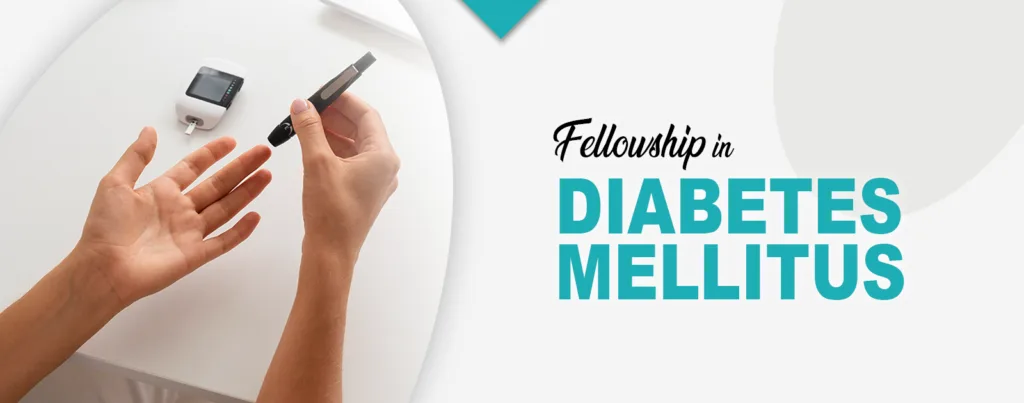
Diabetes mellitus is a chronic metabolic condition represented by elevated blood glucose (sugar) levels and has become a significant health issue worldwide. The statistics show that 589 million adults have lived with diabetes in 2024, with the International Diabetes Federation (IDF) stating that approximately 11.1% of the adult population is affected.
Glucose is produced from the food eaten, particularly carbohydrates. It is vital for health because it serves as an essential source of energy for the cells that comprise the body's muscles and tissues.
Insulin, which is secreted by the pancreas, regulates blood sugar (glucose) levels. In diabetes mellitus, there is either no production of insulin, or the insulin produced is in insufficient amounts, or the body is not able to utilise it properly, which is called insulin resistance.
Fellowship in Diabetes Mellitus offers an in-depth understanding and hands-on experience in managing this complex condition. The following section explores the understanding of diabetes, its types, symptoms, and management, as well as the benefits, structure, and opportunities associated with pursuing a fellowship in Diabetes Mellitus in India.
Some of the common types of Diabetes Mellitus are:
Prediabetes: It is the condition where the blood sugar level tends to be on the higher side but not high enough to be categorised as type 2 diabetes.
Type 1 Diabetes: In Type 1 diabetes mellitus, the immune system attacks and eliminates insulin-producing beta cells located in the pancreas. It commonly occurs in childhood or adolescence but can also onset in adults. Individuals diagnosed with type 1 diabetes require continuous insulin treatment throughout their lives.
Type 2 Diabetes: Type 2 diabetes occurs when the body develops insulin resistance or when the pancreas fails to produce sufficient insulin. This type is often associated with lifestyle factors and tends to be diagnosed more frequently in adults than in children, adolescents, and younger adults.
Gestational Diabetes: Gestational diabetes occurs during pregnancy and typically resolves after childbirth. However, it increases the chances of developing type 2 diabetes later in life for both the mother and child. It is essential to monitor and manage gestational diabetes to prevent complications during pregnancy and delivery.
Type 1 diabetes mellitus is less prevalent, comprising approximately 5-10% of all diabetes cases, while Type 2 diabetes mellitus is the most common form, accounting for about 90-95% of all cases.
The symptoms of diabetes mellitus can vary depending on a person's blood sugar levels. Common symptoms include:
The diagnosis of diabetes mellitus is made through several blood tests, including:
Medical Treatments of diabetes mellitus include:
Managing diabetes involves a combination of lifestyle changes and medical treatments. The lifestyle modifications involve:
If diabetes mellitus is not appropriately managed, it can lead to several serious complications. Three major complications of uncontrolled diabetes are:
Other complications include:
There is no known way to prevent Type 1 diabetes mellitus as it is an autoimmune disorder. However, type 2 diabetes and gestational diabetes can often be prevented or delayed through healthy lifestyle choices.
Some of the prevention tips are:
Diabetes Mellitus is on the rise these days due to the sedentary lifestyles and erratic dietary habits of most people. Therefore, with the rise in the population suffering from diabetes, there is also a need for specialised medical professionals who can tackle this metabolic disorder with precision and deliver the proper intervention. The fellowship in Diabetes mellitus offers an ideal step for medical professionals to upskill and grow in this field.
Fellowship in Diabetes Mellitus by MediCOLL Learning is designed by leading diabetologists and physicians who bring a wealth of knowledge to the program, while also accommodating the hectic schedules of working medical professionals.
The fellowship is delivered online, which provides flexibility and accessibility to learn at one's own pace and convenience. The fellowship is collaborated with prestigious universities, including the University of Liverpool, the Royal College of Physicians, and the NHS (UK), eIntegrity and CPD accredited.
The collaboration and accreditation make the fellowship credible and relevant to both Indian and international healthcare contexts.
Other advantages of pursuing an Online Fellowship in Diabetes Mellitus are:
Specialised Knowledge and Skills: The Diabetes mellitus fellowship India provides comprehensive training in diabetes management, covering aspects such as advanced pharmacotherapy, insulin pump therapy, continuous glucose monitoring, and the management of diabetes complications.
Multidisciplinary Approach: Diabetes care often involves a multidisciplinary team, including endocrinologists, dietitians, nurses, and educators. A fellowship emphasises collaboration, equipping participants with the skills to work effectively within the team.
Enhanced Career Prospects: Specialising in diabetes can open doors to various career opportunities, including academic positions, leadership roles in diabetes centres or hospitals, and consultancy positions in healthcare organisations.
Research Opportunities: Participants interested in clinical research and academic-oriented careers have better opportunities after completing the fellowship. This way, the participant can contribute to advancements in diabetes care and the understanding of the disease.
An Online Fellowship in Diabetes is a valuable opportunity for medical professionals to gain specialised knowledge and skills in managing this prevalent condition.
With a comprehensive and holistic approach to knowledge, clinical training, and working with a multidisciplinary team, participants are well-equipped to make significant contributions to diabetes care and improve patient outcomes.
For medical professionals passionate about diabetes management who aspire to advance their careers in this field, a fellowship program is the perfect next move in their professional journey.
© Copyrights 2025 Medicoll All rights reserved.